Podcast
Questions and Answers
What is the primary function of the rumen in ruminant animals?
What is the primary function of the rumen in ruminant animals?
The primary function of the rumen is to ferment food and produce volatile fatty acids (VFAs).
What is the main difference between the teeth of ruminant and monogastric animals?
What is the main difference between the teeth of ruminant and monogastric animals?
Ruminants have complex teeth, while monogastrics have simpler teeth.
What is the role of microorganisms in the digestive system of ruminant animals?
What is the role of microorganisms in the digestive system of ruminant animals?
Microorganisms aid in fermentation in the rumen.
What is the primary function of the omasum in ruminant animals?
What is the primary function of the omasum in ruminant animals?
How do ruminant and monogastric animals differ in their diet?
How do ruminant and monogastric animals differ in their diet?
What is the function of saliva in ruminant animals?
What is the function of saliva in ruminant animals?
What is the primary function of the small intestine in both ruminant and monogastric animals?
What is the primary function of the small intestine in both ruminant and monogastric animals?
What is a key health consideration in ruminant animals?
What is a key health consideration in ruminant animals?
What is the economic importance of understanding the digestive systems of animals?
What is the economic importance of understanding the digestive systems of animals?
What is the primary difference between the digestive systems of ruminant and monogastric animals?
What is the primary difference between the digestive systems of ruminant and monogastric animals?
Flashcards are hidden until you start studying
Study Notes
Nutrition and Digestion
- Nutrition is the process of obtaining and using food, which can be classified into autotrophic and heterotrophic types.
- Digestion is the breakdown of food through mechanical and chemical processes.
Teeth and Saliva
- Teeth types include incisors, canines, premolars, and molars, which have functions in cutting, tearing, and grinding food.
- Saliva contains enzymes such as amylase and lipase, aiding in lubrication and starch digestion.
Ruminant Animals
- Ruminant animals have four stomach compartments: rumen, reticulum, omasum, and abomasum.
- The rumen is the largest compartment, anaerobic, and ferments food, producing volatile fatty acids (VFAs).
- The reticulum has a honeycomb structure and aids in rumination (cud chewing).
- The omasum absorbs water and minerals.
- The abomasum is the true stomach, with an acidic pH, and contains digestive enzymes.
Digestion in Young Ruminants
- Young ruminants have a similar digestion process with adaptations for growth.
Small and Large Intestine
- The small intestine consists of the duodenum, jejunum, and ileum, which receive bile and pancreatic juice, and absorb nutrients.
- The large intestine includes the caecum and colon, which are responsible for water absorption and vitamin production.
Monogastric Animals
- Monogastric animals have a single stomach system, with a simpler digestion process without fermentation.
- Monogastrics have varied diets, simpler teeth, and simpler saliva.
Comparison and Key Facts
- Ruminants primarily eat plant material, while monogastrics have varied diets.
- Ruminants use saliva to aid in fermentation, whereas monogastrics have simpler saliva.
- Both ruminants and monogastrics absorb nutrients in the small intestine, but ruminants also digest cellulose.
- Microorganisms aid in fermentation in ruminants, but are absent in monogastrics.
Health Considerations and Economic Importance
- Ruminants can suffer from bloat, while monogastrics require balanced diets.
- Understanding digestive systems is crucial for efficient animal production.
Studying That Suits You
Use AI to generate personalized quizzes and flashcards to suit your learning preferences.




